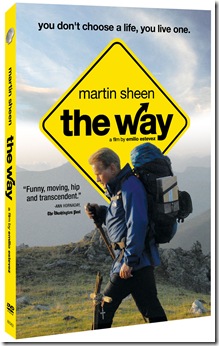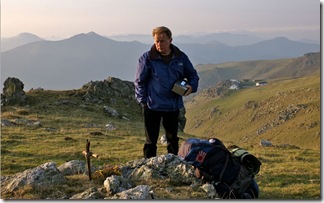Generally speaking, uplifting/inspirational movies tend to be clusters of clichés gathered together in a group and wallowing in mushy scores and ham-fisted acting. The Way opts to go another way – it’s a gentle, almost meandering story about a man coming to grips with the loss of a son and both finding himself and finding his way into a community – a blessedly cliché-free take on what Joseph Campbell called the Hero’s Journey.
Tom Avery [Martin Sheen] is a California opthamologist who tends to be a bit on the irascible side, though his patients and colleagues seem to love him. One day, he’s playing golf with some colleagues when he gets the phone call all parents dread. His son, Daniel [Emilio Estevez] has been killed in France.
Clearing his calendar for a week, Tom travels to France to identify the body and bring his son’s remains home. A local policeman [Tcheky Karyo] informs him that Daniel had died one day into a pilgrimage – The Way of Saint James [El Camino de Santiago]. Unable to get to sleep, Tom makes the decision to have Daniel’s remains cremated and sets out to take the pilgrimage himself.
The next morning, decked out in Daniel’s gear, Tom sets out.
At first he’s doing this for his son, although it’s pretty clear he’s not happy about it. He walks full speed ahead. Even when he encounters other pilgrims, he seems to think he’s in a race. But as the days pass, he slowly acquires companions – Joost from Amsterdam [Yorick van Wageningen], a gregarious fellow who loves his food but says he’s taking the pilgrimage to lose weight; Sarah [Deborah Kara Unger], an angry Canadian woman who refers to tom as ‘Boomer’, and Jack [James Nesbitt] from Ireland, a writer of travel books, now suffering from writer’s block.
In spite of himself, Tom slowly becomes part of the group – following an afternoon of drinking during which he insults all three of the others and winds up in a police station, handcuffed to a radiator – the act of learning about the others, each of whom has a very different reason for being there than they initially claim, teaches him that he’s not the only one in pain.
The Way of Saint James was shot, in sequence, along the actual El Camino De Santiago; the locations used were the real deal, and the other pilgrims we see passing by are actual pilgrims. Much of the film was shot using natural light.
As a Hero’s Journey, Tom’s pilgrimage is about slowing down, smelling the flowers, getting to know himself and realizing that this is something he can’t do alone. At times, along the way, he sees Daniel – whose smile, or disappointed shaking of his head give tom clues as to what he’s doing right or wrong.
As with any Hero’s Journey, Tom is on a quest and there are obstacles to be overcome – both physical [his backpack is involved in the two major setbacks, once humorously] and spiritual – and like all quests, is better tackled with help. His biggest obstacle, of course, is himself, but the help comes from the small community of friends which he becomes part of.
Although the pilgrimage that is central to the story is one that deep significance in Catholic lore, The Way is not a religious film. Its spiritual components are not those of the church, but those of self discovery.
Sheen is a marvel to watch here, as Tom slowly goes from bereaved father and general loner, to a more rounded character capable of seeing and attending to the needs of others – if only by listening to them and welcoming them into his life. Watching him grow through his journey along The Way is something akin to peeling the layers of an onion and discovering a mango at the center.
Unger is the film’s edgy component. Sarah’s reasons for being on The Way have to do with pain and trust issues, and they are given impact by making her Canadian, a people known for their good nature, politeness and trustworthiness. In a later scene in the film, seeing her at ease with her three new, male friends is like watching a particularly brilliant sunrise.
Von Wageningen ‘s Joost is both comic relief and the character who reveals the deepest heart. There is a moment when he simply transcends everything we’ve come to know about him.
Nesbitt’s Jack is the energy that fuels the others’ transformations. As a writer, he’s given to asking questions and Nesbitt keeps him from seeming too intrusive – especially when he is. Through Jack, we learn more about the others, especially in Tom’s case.
Throughout, The Way never lapses into easy cliché, choosing invariably to take the road less traveled, as it were. As a result, The Way is able to be uplifting without inducing winces, cringes, or other forms of audience discomfort.
Estevez wrote and directed The Way – incorporating bits from a 1994 book, Off the Road: A Modern Day Walk Down The Pilgrim’s Route to Spain, by Jack Hitt – and it is a truly unique and, yes, uplifting experience. He’s put together a cast that includes top European actors [Karyo, Antonio Gil, Eusebio Lazaro…], amazing character actors [Matt Clark, Spencer Garrett] and even producer David Alexanian, to play small but pivotal roles in support of his excellent core cast.
The cinematography is frequently breathtaking – though many incredible beautiful locations are kind of thrown away because the characters are so well drawn, and their development so involving, that we aren’t as likely to pay as much attention to them. Kudos to Juan Miguel Azpiroz, anyway.
Tyler Bates provides a score that is both beautiful and subtle – developing the themes of the film without becoming intrusive – and the music selection, from James Taylor to Nick Drake to Alanis Morrisette, is as close to perfect as you get.
The Way is remarkable and unforgettable – even if you are [like Tom] not a particularly religious person. As Antonio Gil’s Gypsy Hombre de Respecto says in a key scene, ‘It’s not about religion. Not at all.’ It’s about humanity and discovery of one’s heart.
Features include: Audio commentary by Esteven, Sheen and Alexanian; Camino americana: Taking The Way On The Road; Pilgrimmage: Behind The Camera; Father & Son: Uncovering The characters, and Along The Way: The Journey Of A Father & Son – a dual memoir by Martin Sheen and Emilio Estevez.
Learn more about The Way – including how to buy it – at http://theway-themovie.com/.
Grade: The Way – A+
Grade: Features – A+
Final Grade: A+

